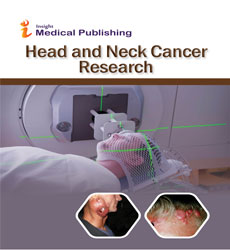A Brief Note on Chemoprevention for Oral Cancer
Abou Alfa*
Department of Gastrointestinal Oncology, Memorial Sloan Kettering Cancer Centre, New York
- *Corresponding Author:
- Abou Alfa
Department of Gastrointestinal Oncology, Memorial Sloan Kettering Cancer Centre, New York, Email: abou_alfa@izsto.edu
Received Date: October 04, 2021; Accepted Date: October 08, 2021; Published Date: November 04,
2021
Citation: Abou A (2021) A Brief Note on Chemoprevention for Oral Cancer. Head Neck Cancer Res. Vol.6 No.5.40
Abstract
Abstract
The process or the phenomena of the chemoprevention is one if the utmost criteria in the cancer treatments. The different types of the therapies that are included for preventing cancer are discussed in this present commentary article. Also, the natural as well as the synthetic forms of the chemo-preventative substances are also listed. The future COX-2 inhibitors as the chemoprevention agents, these will depend on the extent of the cancer cause as they are associated with certain class of agents were also discussed.
Introduction
The chemoprevention is a process in which the malignant progression that is responsible for the occurrence of invasive cancer delayed or made reverse. This phenomenon can be delayed or reversed by the application or by the use of the certain natural of synthetic substances. The well-known or the mostly used substance for halting the malignant progression of the oral is retinoid. By the application of the 13-cis-retinoic acid for three months, almost 75% of the clinical response is yielded with respect to the 10% of the placebo. The toxicity rate is not so high and also considerable; the high rate of the relapse is seen within three months of the stoppage of the treatment. With the several studies and surveys that are been gone through since years, reveal that the patients with the pre-malignant lesions have confirmed with certain clinical as well as the pathological responses with lesser toxicological responses though.
In terms of the retinoid therapy, there are certain abnormalities molecularly are persisted in some patients with the fullest of clinical as well as the pathological responses. The other substances or the reagents that are used in the chemoprevention are vitamin E, a soybean extraction such as bowman-birk inhibitor concentrate (BBIC), curcumin and a component of green tea i.e., polyphenol epigallocatechin. These generally have less toxicity when compared to the synthetic agents or substances. As of now in the current developmental studies, the focus is on the agents that are targeted to the specific steps in the molecular progression. The development seems to be from the normal pre-malignancy to the invasive carcinoma. In molecularly targeted agents, the promising results are seen according to the studies, the study can be conducted in the animal models that are available and the agents used include the cyclooxygenase – COX 2 inhibitors and dermal growth factor receptor inhibitors. The data that is obtained from the analysis or the study performed by many researchers reveal that, COX-2 inhibitors is the good pathway for the oral cancer prevention. Also, these COX-2 inhibitors are overexpressed in the head as well as neck squamous carcinoma and therefore, they help in the prevention of the oral cancer development.
The randomized placebo, a controlled trail of COX-2 inhibitor when administered for the oral rinse in the case of patients with leukoplakia, revealed that the treatment is much well tolerated and do not result with much difference in the clinical response in comparison with the placebo. The future COX-2 inhibitors as the chemoprevention agents, these will depend on the extent of the cancer cause as they are associated with certain class of agents. The other inhibitors, such as EGFR alone or in combination with the also promises the divergent effects in prevention from the malignant progressions. These are generally overexpressed in the patients with the oral invasive cancer with poor progenesis of head and neck squamous carcinoma. The EGFR generally, shows the activity of inhibition of the premalignant progression. The chemoprevention seems like a promising approach for preventing the malignant progressions with respect to the several clinical studies.
Acknowledgments
None
Conflicts of Interest
The authors declare that there are no conflicts of interest.
Open Access Journals
- Aquaculture & Veterinary Science
- Chemistry & Chemical Sciences
- Clinical Sciences
- Engineering
- General Science
- Genetics & Molecular Biology
- Health Care & Nursing
- Immunology & Microbiology
- Materials Science
- Mathematics & Physics
- Medical Sciences
- Neurology & Psychiatry
- Oncology & Cancer Science
- Pharmaceutical Sciences
